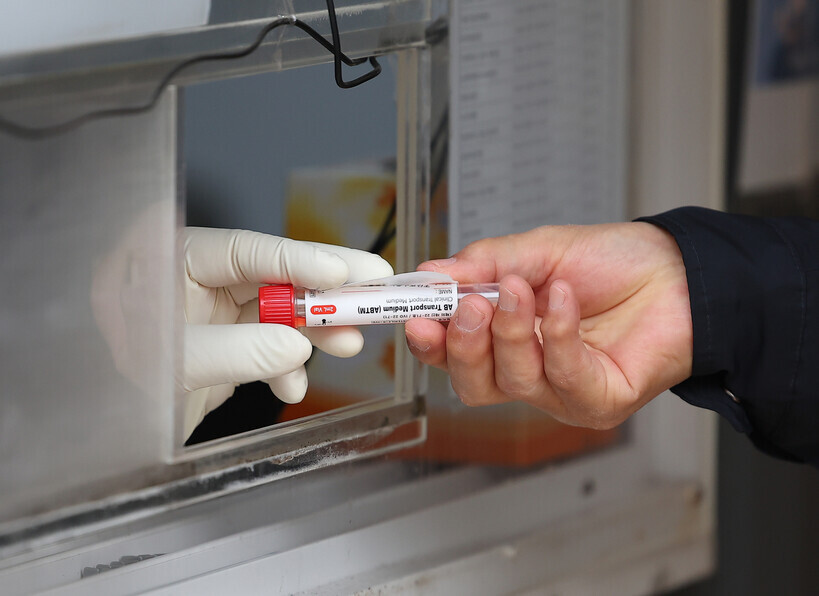hankyoreh
Links to other country sites 다른 나라 사이트 링크
S. Korea reports first case of Omicron recombinant XL

A hybrid Omicron variant has turned up for the first time in a COVID-19 patient in South Korea. Furthermore, the number of people infected with COVID-19 two or more times now exceeds 26,000, or 0.3% of the total number of confirmed cases in the country.
“We have identified the first case of the Omicron variant known as XL in a domestic patient and are carrying out an epidemiological review of the case,” said Lee Sang-won, head of the epidemiological research and analysis team at the Central Disease Control Headquarters (CDCH), under the Korea Disease Control and Prevention Agency, on Tuesday.
The patient, who tested positive on March 23, had been fully vaccinated and boosted for COVID-19. The individual hadn’t traveled overseas around the presumed time of infection and is currently out of quarantine without any notable health issues.
The XL variant is a genetic recombination of the BA.1 and BA.2 (“stealth Omicron”) subvariants of the Omicron variant of COVID-19. It’s one of 17 recombinants whose lineages have been identified so far.
Following its discovery in the UK in February, 66 cases of XL have been identified in the UK alone. The World Health Organization classifies the recombinant as Omicron.
The UK Health and Safety Executive reported on March 25 that most recombined subvariants had disappeared without spreading.
“Caution is needed, but we shouldn’t fall prey to excessive concern. Variants are often eliminated naturally, rather than becoming dominant. This will have a limited impact on our current social distancing and disease control regime,” Lee said.
When the CDCH reviewed the 9,243,907 total people who have been infected with COVID-19 from January 2020 to March 19 of this year, it found what appeared to be 26,239 presumed cases of reinfection, or 0.284% of the total. That included 26,202 people who had been infected two times and 37 people who had been infected three times.
The presumed rate of reinfection had remained at 0.098% (570 of 579,724 people) through December 2021. But since the Omicron wave began in January 2022, the reinfection rate has tripled to 0.296% (25,632 of 8,664,146 people).
That’s a huge jump over the government’s tally of 346 (through March 27), which only included people who had submitted reinfection reports.
However, Korea’s reinfection rate is lower than in other countries. The UK reported a reinfection rate of 10% in January and February 2022 alone, while France reported a reinfection rate of around 3.1% between March 2021 and Feb. 20 of this year.
“The presumed reinfection rate in Korea is low because we had relatively few primary infections through December of last year, but the number of primary infections has gone up considerably during the Omicron wave. We expect that impact to become apparent at least 45 days from now, so the number of reinfections could go up a lot in the future,” said Park Yeong-jun, head of epidemiological research at the CDCH.
People who are reinfected have a lower-than-average chance of developing a serious or fatal case of COVID-19, statistics show. Following reinfection, 14 patients have become critically ill and 15 have died (two critically ill patients died during data tallying and are double-counted in deaths), representing a serious case incidence rate of 0.10% and a case fatality rate of 0.06%.
That compares to a serious case incidence rate of 0.27% and a case fatality rate of 0.12% for all COVID-19 patients through March 20.
By Lim Jae-hee, staff reporter
Please direct questions or comments to [english@hani.co.kr]

Editorial・opinion
![[Guest essay] Preventing Korean Peninsula from becoming front line of new cold war [Guest essay] Preventing Korean Peninsula from becoming front line of new cold war](https://flexible.img.hani.co.kr/flexible/normal/500/300/imgdb/original/2024/0507/7217150679227807.jpg) [Guest essay] Preventing Korean Peninsula from becoming front line of new cold war
[Guest essay] Preventing Korean Peninsula from becoming front line of new cold war![[Column] The state is back — but is it in business? [Column] The state is back — but is it in business?](https://flexible.img.hani.co.kr/flexible/normal/500/300/imgdb/original/2024/0506/8217149564092725.jpg) [Column] The state is back — but is it in business?
[Column] The state is back — but is it in business?- [Column] Life on our Trisolaris
- [Editorial] Penalties for airing allegations against Korea’s first lady endanger free press
- [Editorial] Yoon must halt procurement of SM-3 interceptor missiles
- [Guest essay] Maybe Korea’s rapid population decline is an opportunity, not a crisis
- [Column] Can Yoon steer diplomacy with Russia, China back on track?
- [Column] Season 2 of special prosecutor probe may be coming to Korea soon
- [Column] Park Geun-hye déjà vu in Yoon Suk-yeol
- [Editorial] New weight of N. Korea’s nuclear threats makes dialogue all the more urgent
Most viewed articles
- 1Behind-the-times gender change regulations leave trans Koreans in the lurch
- 2Yoon’s revival of civil affairs senior secretary criticized as shield against judicial scrutiny
- 3South Korean ambassador attends Putin’s inauguration as US and others boycott
- 4Family that exposed military cover-up of loved one’s death reflect on Marine’s death
- 5Hybe-Ador dispute shines light on pervasive issues behind K-pop’s tidy facade
- 6[Guest essay] Preventing Korean Peninsula from becoming front line of new cold war
- 7[Editorial] New weight of N. Korea’s nuclear threats makes dialogue all the more urgent
- 8‘Weddingflation’ breaks the bank for Korean couples-to-be
- 9Yoon’s broken-compass diplomacy is steering Korea into serving US, Japanese interests
- 10U.S. band that performed in N. Korea looking forward to going back